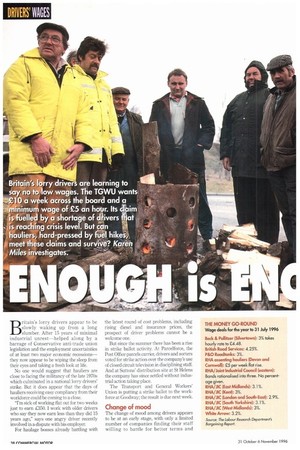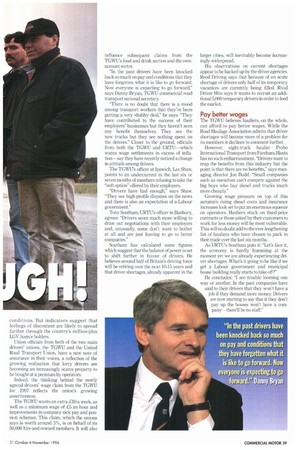B ritain's lorry drivers appear to be slowly waking up from
Page 40

Page 41

If you've noticed an error in this article please click here to report it so we can fix it.
a long slumber. After 15 years of minimal industrial unrest—helped along by a barrage of Conservative anti-trade union legislation and the employment uncertainties of at least two major economic recessions— they now appear to be wiping the sleep from their eyes and taking a fresh look at life.
No one would suggest that hauliers are close to facing the militancy of the late 1970s which culminated in a national lorry drivers' strike. But it does appear that the days of hauliers receiving easy compliancy from their workforce could be coming to a close.
"Fm sick of working flat out for two weeks just to earn £350. I work with older drivers who say they now earn less than they did 15 years ago," says one angry driver recently involved in a dispute with his employer.
For haulage bosses already battling with the latest round of cost problems, including rising diesel and insurance prices, the prospect of driver problems cannot be a welcome one.
But since the summer there has been a rise in strike ballot activity. At Parcelforce, the Post Office parcels carrier, drivers and sorters voted for strike action over the company's use of closed circuit television in disciplining staff. And at Suttons' distribution site at St Helens the company has since settled without industrial action taking place.
The Transport and General Workers' Union is putting a strike ballot to the workforce at Goodway: the result is due next week.
The change of mood among drivers appears to be at an early stage, with only a limited number of companies finding their staff willing to battle for better terms and conditions. But indicators suggest that feelings of discontent are likely to spread further through the country's million-plus LGV licence holders.
Union officials from both of the two main drivers' unions, the TGWU and the United Road Transport Union, have a new note of assurance in their voices, a reflection of the growing realisation that lorry drivers are becoming an increasingly scarce property to be bought at a premium by operators.
Indeed, the thinking behind the newly agreed drivers' wage claim from the TGWU for 1997 reflects the union's growing assertiveness.
The TGWU wants an extra £10 a week, as well as a minimum wage of a an hour and improvements in company sick pay and pension schemes. This claim, which the unions says is worth around 3%, is on behalf of its 50,000 hire-and-reward members. It will also influence subsequent claims from the TGWU's food and drink section and the ownaccount sector.
"In the past drivers have been knocked back SO much on pay and conditions that they have forgotten what it is like to go forward. Now everyone is expecting to go forward," says Danny Bryan, TGWU commercial road transport national secretary.
"There is no doubt that there is a mood among transport workers that they've been getting a very shabby deal," he says. "They have contributed to the success of their employers' businesses but they haven't seen any benefit themselves. They see the new trucks but they see nothing spent on the drivers." Closer to the ground, officials from both the TGWU and URTU—which wants wage settlements in excess of inflation—say they have recently noticed a change in attitude among drivers.
The TGWU's officer at Ipswich, Les Shaw, points to an undercurrent in the last six or seven months of members refusing to take the "soft option" offered by their employers.
"Drivers have had enough," says Shaw. "They see high-profile disputes on the news and there is also an expectation of a Labour government."
Tony Southam, URTU's officer in Banbury agrees: "Drivers seem much more willing to draw out negotiations with their employers and, unusually, some don't want to bother at all and are just leaving to go to better companies."
Southam has calculated some figures which suggest that the balance of power is set to shift further in favour of drivers. He believes around half of Britain's driving force will be retiring over the next 1045 years and that driver shortages, already apparent in the larger cities, will inevitably become increasingly widespread.
His observations on current shortages appear to he backed up by the driver agencies. Reed Driving says that because of an acute shortage of drivers only half of its temporary vacanices are currently being filled. Rival Driver Hire says it wants to recruit an additional 5,000 temporary drivers in order to feed the market.
Pay better wages
The TGWU believes hauliers, on the whole, can afford to pay better wages. While the Road Haulage Association admits that driver shortages will become more of a problem for its members it declines to comment further.
However, eight-truck haulier Probo International Transport from Fareham, Hants has no such embarrassment. "Drivers want to reap the benefits from this industry but the point is that there are no benefits," says managing director Jon Budd. "Small companies such as ourselves can't compete against the big boys who buy diesel and trucks much more cheaply."
Growing wage pressure on top of this autumn's rising diesel costs and insurance increases look set to put an enormous squeeze on operators. Hauliers stuck on fixed-price contracts or those asked by their customers to work for less money will be most vulnerable. This will no doubt add to the ever-lengthening list of hauliers who have chosen to pack in their trade over the last six months.
As MTh's Southam puts it: "Let's face it, the economy is hardly humming at the moment yet we are already experiencing driver shortages. What's it going to be like if we get a Labour government and municipal house building really starts to take off?"
He concludes: "I see trouble looming one way or another. In the past companies have said to their drivers that they won't have a job if they demand more money Drivers are now starting to say that if they don't pay up the bosses won't have a company there'll be no staff."




































































































































